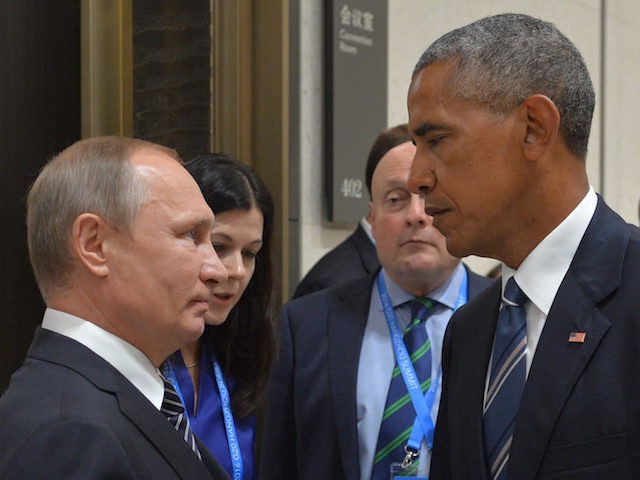Various analysts and news outlets favorable to President Barack Obama have acknowledged that the president’s decision to essentially deport 35 U.S.-based Kremlin diplomats suspected of serving as intelligence operatives and impose sanctions on Russia’s two leading intelligence services are meant to “box in” President-elect Donald Trump.
In response to Obama’s measures, Russian President Vladimir Putin gave the U.S. president the cold shoulder, saying from now on any future attempt to engage with the United States would take place under the incoming administration.
Moreover, President Obama expected Putin to follow the long history of retaliation and reciprocal expulsions that has governed the relationship between the United States and Russia for decades, but the Kremlin leader instead chose to deviate from the typical diplomatic protocol of tit-for-tat.
Putin’s reaction went against high-ranking Kremlin officials urging the Russian president to retaliate, a move that completely undermined Obama’s effort to make it difficult for the incoming commander-in-chief to improve relations with Russia.
In the statement responding to the sanctions, Putin said the Kremlin “will not resort to the level of irresponsible ‘kitchen’ diplomacy,” using what the New York Times (NYT) described as “a common Russian idiom for quarrelsome and unseemly acts.”
Obama’s move appears to have backfired, granting the incoming administration leeway to pursue the Moscow-approved restoration of Russia-U.S. relations that Trump has been advocating.
NYT notes:
Should Mr. Putin have chosen to retaliate harshly against the United States [as Obama expected], he would most likely have deepened the rift between the two countries and left President-elect Donald J. Trump with a nettlesome diplomatic standoff from the moment he arrived in the Oval Office.
But by choosing to essentially disregard Mr. Obama’s punitive measures, Mr. Putin can try to disarm his American critics, including members of Congress who consider him an aggressive foe of the United States. That could give Mr. Trump more room to pursue the closer cooperation with Russia that he has advocated
“This is a perfect step because it makes Obama’s administration look very weak and it opens a new page in relations with Trump,” Vladimir Frolov, an international affairs analyst and a columnist, told the Times. “Moscow wanted Trump to have room to maneuver; this decision is a clear gesture of good will toward him.”
Various analysts have used the “box in” expression in reference to Obama’s Russia move, including Eric Lorber, a senior adviser at the Center on Sanctions and Illicit Finance at the Foundation for Defense of Democracies (FDD); and Kellyanne Conway, who managed Trump’s campaign and has been selected to serve as a counselor to the Republican president in the White House, and mainstream media outlets like NYT.
Obama’s actions came in response to Russia allegedly trying to influence the 2016 elections through the supposed hacking of both the Democratic National Committee’s servers and the email account of Clinton campaign chair John Podesta. The Podesta emails were ultimately published online by the organization Wikileaks shortly before the election. Those who accuse Russia of the hacking claim the move was intended to obtain information that came from the minds of the Democrats themselves. Some have blamed the hacking scandal for the demise of Democratic presidential nominee Hillary Clinton, implying that the DNC and Podesta’s own words impacted the decision of Americans who voted against Mrs. Clinton.
The Obama administration has yet to provide public evidence linking Russia to Wikileaks.
Various media outlets have erroneously conflated the cyberattack against the DNC and Podesta with a hacking of the U.S. electoral system. There is also no evidence the latter occurred.
Putin has denied the Obama administration’s accusations of Russian cyberattacks intended to influence U.S. presidential elections.
According to the State Department, the ejection of the Russian diplomats – dubbed by the Times “the strongest American response yet to a state-sponsored cyberattack” – is also a response to the increasing “pattern of harassment” of American diplomats in Russia.
Despite being friendly to the Obama administration, Vox Media suggested the president’s actions against Russia are toothless, noting they are unlikely to “frighten Putin into changing his behavior.” Vox conceded Obama’s move is intended “to make it significantly harder for Trump to start his tenure in the White House with an immediate effort to improve ties with Vladimir Putin.”
The Trump team has denounced the DNC hacking, insisting that it remains unclear whether it was a state-sponsored cyberattack by Russia at the behest of Putin. Trump’s incoming White House Chief of Staff Reince Priebus told Eric Bolling last week, “We agree that foreign governments should not be hacking into American institutions, period!”

COMMENTS
Please let us know if you're having issues with commenting.